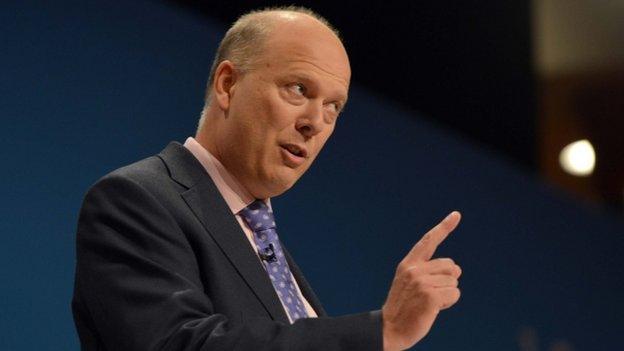Probation reforms 'moving too quickly', inspector warns
- Published

The new-look system sees high-risk offenders managed by a new body, the National Probation Service
Changes to probation services in England and Wales are being pushed through too quickly, the service's chief inspector has warned.
A report by Paul McDowell found staff had been told of some changes by email to be implemented the next day with "little or no time for training".
Justice Secretary Chris Grayling is overhauling the service in an attempt to reduce re-offending.
The government says reforms are being phased to ensure public safety.
Changes have seen the probation service split in two, with £450m in contracts offered to private and voluntary sector organisations to run Community Rehabilitation Companies (CRCs) to supervise low and medium-risk offenders.
High-risk ones are managed by a new public sector organisation - the National Probation Service (NPS).
Mr McDowell claims the speed of changes to the service "caused operational problems that could have been avoided or mitigated".
He said they exposed existing flaws in the system, including shortfalls in "processes, practice quality, consistency, leadership and management".

Justice officials have stressed that changes were necessary and that the service was improving
His report also warned that splitting the service had created new process, communication and information-sharing problems.
Justice officials have stressed that changes were necessary and that the service was improving.
"This report paints a picture of a service in transition", Justice Minister Andrew Selous said.
"While significant progress has been made since the inspections, there is more to do and we are not complacent."
The changes have faced opposition from staff, with probation officers' union Napo launching a legal challenge.
Napo had said protection laws stopping private firms accessing personal data had meant probation officers working for CRCs did not have full access to offenders' records.
The union said this meant staff could not assess individuals safely or make a rational judgement as to their risk to the community.
Napo later said it was withdrawing the judicial review after Mr Grayling gave a series of undertakings to the court. The Ministry of Justice said it was pleased and reforms were "essential".
The union said it would "closely monitor" the amendments Mr Grayling makes to the plans.
Correction 16 December 2014: This story has been amended to clarify that Napo withdrew its legal challenge on 8 December.
- Published8 December 2014

- Published5 December 2014

- Published30 October 2014

- Published29 October 2014
